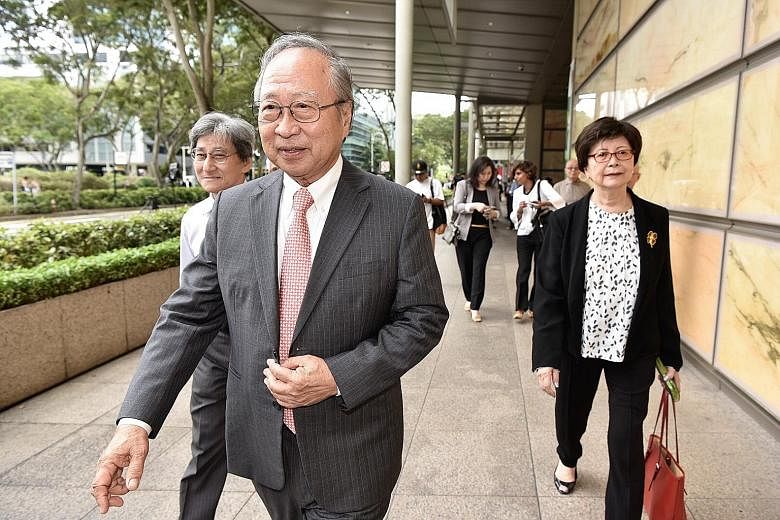Lawyers for former presidential candidate Tan Cheng Bock and the Government yesterday argued in the apex court about how the Constitution defines a president.
Senior Counsel Chelva Retnam Rajah said a president must be someone who was popularly elected, while Deputy Attorney-General Hri Kumar Nair said the constitutional definition of president included those who were elected by Parliament and by the people.
The two men were arguing about how Article 19(B)1 in the Constitution should be read.
The provision allows the Government to reserve a presidential election for candidates from a particular community if it has not been represented in the highest office in the land for five consecutive terms.
The upcoming September election has been reserved for Malay candidates, and former presidential candidate Tan Cheng Bock is challenging the timing and basis of this.
The High Court had, on July 7, dismissed his challenge.
Appealing this yesterday, Dr Tan, who was represented by Mr Rajah, said it was unconstitutional for the Government to start its count of the five terms needed to trigger a reserved election from the term of President Wee Kim Wee.
Mr Rajah said that for the purposes of this count, a president must be elected by the people in an open election.
President Wee, who was the first president to be vested with the powers of the elected president, was elected by Parliament. He was followed by President Ong Teng Cheong, who was elected by Singapore citizens in the first presidential election in 1993.
If Mr Rajah's arguments prevail and the count starts from President Ong's term, the reserved election would start in 2023 at the earliest.
It would mean that Dr Tan, 77, who lost narrowly to current President Tony Tan Keng Yam in 2011, could apply to stand in the election, although the updated eligibility criteria mean he is unlikely to qualify.
He had made known his desire to contest the election in March last year.
The Court of Appeal, with five judges presiding, including Chief Justice Sundaresh Menon, had reserved judgment on the case.
Chief Justice Menon - who headed a constitutional commission set up to look into changes to the elected presidency - said a decision would be made "as soon as possible".
In arguing against the count, Mr Rajah cited articles from the Constitution and the Interpretation Act to show that the definition of "president" had changed since the elected presidency was introduced in 1991. He said "to be included in the count, you have to be a president who falls within the meaning of president that exists in the Constitution as it appears today".
This means that the Government can start its count only from the term of presidents who were popularly election, starting from President Ong, he added.
But Mr Hri Kumar, representing the Government, said the argument was an attempt to limit the definition of president so as to delay the reserved presidential election set to take place in September .
He said Mr Rajah was putting the definition of president into a "smaller and smaller box" for the sole purpose of disqualifying President Wee's term from the count.
The constitutional definition of president had not changed since 1965, when Singapore became independent, he argued, and covers presidents elected "under this Constitution".
He said the definition of "president" was not affected by how a president was elected, the length of his tenure or power he holds, only that he was elected under the Constitution. This necessarily allows the Government to consider Mr Wee's term in the count of the five terms, he added.
He said Mr Rajah's efforts to "draw a bright red line" to exclude him was "nonsensical".
Taken to its logical conclusion, he added, this would mean that presidents elected before the latest constitutional change last year were no longer considered presidents.
Mr Hri Kumar said the issue was whether the Government had acted legally in starting the count from Mr Wee's term, adding it was legally and fully entitled to do so.
He also said that the Government was not proclaiming Mr Wee a popularly elected president in starting the count from his term, contrary to what people have been saying online.
During the hearing, Chief Justice Menon asked Mr Rajah if Article 163 of the Constitution had any bearing at all on whether Mr Wee could or could not be included in the count.
The Article provides for Mr Wee to be treated as if he was elected by Singapore citizens when the elected presidency came into effect in 1991, midway through his second term in office.
Mr Rajah said the Article was a "transitional provision" and "it doesn't make him or deem him to be an elected president".
He also argued that it was not Parliament's intention, when it passed the changes to the law, to consider the terms of presidents who were not elected at the polls.
Mr Hri Kumar rebutted this, saying the Government had made clear its intention to start the count from Mr Wee's term during parliamentary debates on the issue.
Yesterday's hearing was held in a packed courtroom that included prominent opposition politicians such as Workers' Party chairman and MP Sylvia Lim and former National Solidarity Party secretary-general Lim Tean.
The four other judges are: Judges of Appeal Steven Chong and Judith Prakash, and Justices Chua Lee Ming and Kannan Ramesh.
After the hearing, Dr Tan told reporters: "We got a fair hearing, that's very important... If (the court decides) we are wrong, then we will accept it. That's what democracy is all about - the exchange of ideas. But if we are right, then the Government must also accept it."


